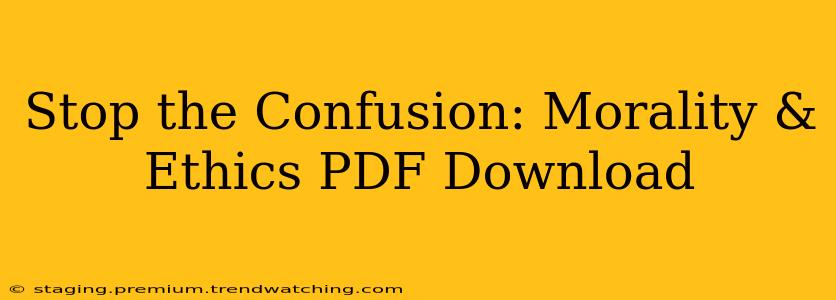The terms "morality" and "ethics" are often used interchangeably, leading to significant confusion. While closely related, they represent distinct concepts with nuanced differences. This article aims to clarify the distinction between morality and ethics, exploring their origins, applications, and implications. We'll also address some frequently asked questions to fully illuminate this important topic.
What is Morality?
Morality refers to an individual's internal sense of right and wrong. It's a deeply personal compass, shaped by factors like upbringing, cultural background, religious beliefs, and personal experiences. Morality guides individual actions and judgments, forming the basis of personal conduct. It's often characterized by a sense of obligation or responsibility towards oneself and others. Moral principles can be highly subjective, varying significantly from person to person. What one person considers morally acceptable, another might deem unacceptable.
What is Ethics?
Ethics, on the other hand, involves a systematic study of moral principles and values. It's a broader, more formal framework than morality, providing a structured approach to analyzing and resolving moral dilemmas. Ethics examines principles of right and wrong behavior within a specific group or profession. Think of ethical codes in medicine, law, or journalism – these are externally imposed guidelines that govern professional conduct. Ethics often seeks to establish universal principles applicable in various contexts, whereas morality remains largely personal.
What is the Difference Between Morality and Ethics?
The key difference lies in their scope and source. Morality is personal and internal, shaped by individual beliefs and experiences. Ethics is external and societal, established through shared values and codified principles within specific groups or professions. Morality deals with individual conscience, while ethics deals with societal norms and professional standards. It's important to note that the two often inform and influence each other. Personal morality can shape ethical codes, and adherence to ethical principles can strengthen one's own moral compass.
Are Morality and Ethics the Same Thing?
No, morality and ethics are not the same, although they are deeply intertwined. Morality is about personal beliefs and values, while ethics are about the principles that guide conduct within a specific context. One can be moral without adhering to specific ethical codes, and vice versa. For example, a person might have strong moral objections to lying but operate in a profession where "white lies" are commonplace. Understanding this distinction is crucial for navigating complex moral and ethical dilemmas in both personal and professional life.
What are Some Examples of Morality vs. Ethics?
Let's consider some illustrative examples:
- Morality: A person chooses not to cheat on a test because they believe it's dishonest and unfair. This is a moral decision rooted in personal values.
- Ethics: A doctor follows the Hippocratic Oath, prioritizing patient well-being and confidentiality. This is an ethical obligation dictated by professional standards.
How Do Morality and Ethics Influence Each Other?
While distinct, morality and ethics are interconnected. Strong personal morality can lead individuals to advocate for ethical reforms within their professions or communities. Conversely, exposure to ethical codes and frameworks can shape and refine an individual's moral compass. This interplay is crucial for creating a just and equitable society.
Conclusion
Understanding the subtle yet significant difference between morality and ethics is vital for navigating the complexities of personal and professional life. While morality defines individual conscience, ethics provides a structured framework for addressing moral dilemmas within specific contexts. The interplay between the two shapes our behaviors, interactions, and ultimately, the fabric of society. By appreciating these nuances, we can engage in more thoughtful, responsible, and ethical decision-making.

